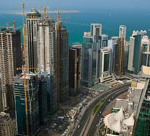
About Qatar
Geographie
Qatar is a peninsula some 11,437 square kilometers in size, located halfway down the west coast of the Arabian Gulf
Demography
The total population is presently in the region of 600,000 and has been increasing at a rate of 9% annually in recent years Caner population centers include Dukhan on me west coast, Mesaieed and Al Wakra in the south, and Ras Laffan and Al Khor in the dh The development of the Ras Laffan Industrial City (RLIC) is creating an expansion of population in the northern part of the country, particularly in Al Khor and areas adjoining Ras Laffan 2
Climate
The country has a moderate desert climate with hot summers and mild winters Winter nights can be cool, but temperatures rarely drop below 7 degrees Celsius Temperatures and humidity rise in coastal cities and towns during summer Rainfall is scarce (average 70mm per year), falling on isolated days mainly between October and March
History
Archeological discoveries, inscriptions and artifacts prove that the land of Qatar was populated as early as 4000 BC In the 5th century BC, the Greek historian, Herodotus, referred to the original seafaring inhabitants of Qatar Qatar played an important role in the Islamic civilization when its inhabitants participated in the formation and provision of the first naval fleet, which was assembled to transport the army during the Islamic conquests
The Qatari Flag
The national flag is maroon with a broad vertical white stripe at the pole, the two colors being separated with a nine-point serrated line The white color signifies the internationally recognized symbol of peace The maroon color symbolizes the blood shed during the several wars Qatar has undergone, particularly in the second half of the 19th century
Government
The Emir is the Ruler of the State. Rule in Qatar is hereditary within the family of Al Thani, whereby power is transferred from father to son. In case no son is available power is transferred to the person whom the Emir chooses within the family of Al Thani His Highness the Emir is the head of the constitutional authorities, holding both legislative and executive powers. The Emir appoints the prime minister and ministers
nternational Relations
Qatar, with proven gas reserves of over 900 trillion standard cubic feet in its huge North Field, and oil reserves of over 4.4 billion barrels, has one of the fastest growing economies and highest per capita incomes in the world In just decades, it has developed as a major global supplier of energy and is set to become the largest exporter of LNG in the world and a world leader in gas-to-liquids (GTL) production
Member of
*The United Nations (UN) Petroleum *The Organization of Petroleum Exporting Countries (OPEC) *The Organization of the Arab Exporting Countries (OAPEC) *The Arab League
Languages and Religion
The official language of the country is Arabic. but English is widely spoken and understood All official documents (such as visa and residents permit applications) must be completed in Arabic Language & Religion Islam is the official religion of the try, and Shari’s (Islamic Law) is the principal source of legislation
Transport & Communication
The country is well served by Doha International Airport, which is located close to the centre of the city Metered taxis and limousines are easy to find. There is a limited public transport system which operates between neighboring towns Car hire companies are located at the airport and at all major hotels . .
